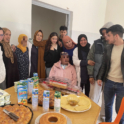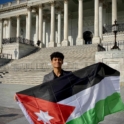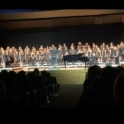Maryame has taken the lessons learned from her exchange year to make a difference in her community.
STORIES
A Solar Powered Computer Literacy Center in Rural Mali
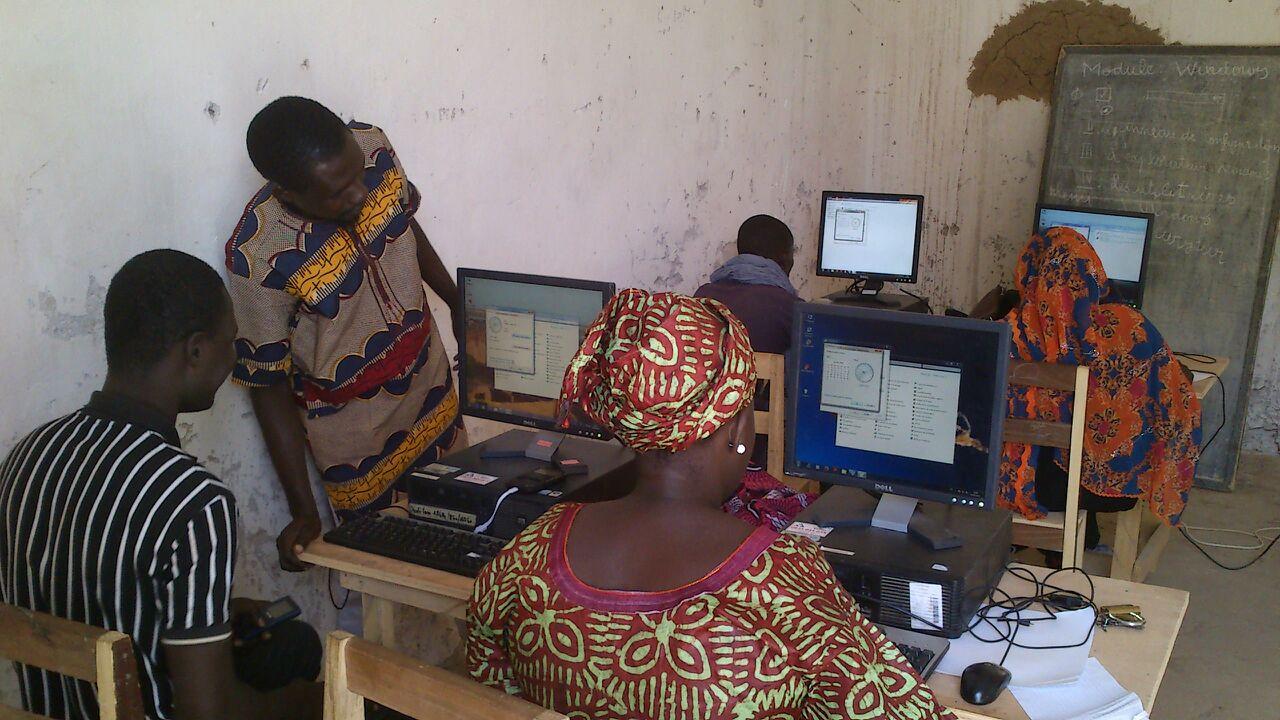
By Mahaitou Maiga, YES 2007-2008, Mali, hosted by AYUSA in Chula Vista, CA
My name is Mahaitou Ibrahim Maiga, and I'm from Mali in West Africa (pictured below). I am a YES alum who recently graduated with a bachelor's degree in Economics and Management. The YES program was a life changing experience for me, and it is still changing my life on a daily basis. Traveling to America as a boy, I was nervous and even afraid because I had no idea what I might encounter during my first weeks. I wondered, "Will the people be nice to me? Is school going to be harder? Can I be an ambassador who will make Mali proud?" I had so many questions but no answers. I told myself that since I had been selected for the YES program, it must be because I could succeed in the United States. I started becoming more independent by involving myself in sports at my high school. I learned to take initiative to become responsible, more mature and open minded. I started to develop leadership skills and worked hard in school. The YES program taught me so much that when I returned home to Bourem, my hometown in rural Mali, I was excited and obliged to serve my community through grassroots projects. I am honored to have been part of setting up the town’s first, and only, information communications technology (ICT) center through a YES alumni grants-funded project, YESICT4ALL. Recently, I led an effort to improve the Center by powering it with solar energy.
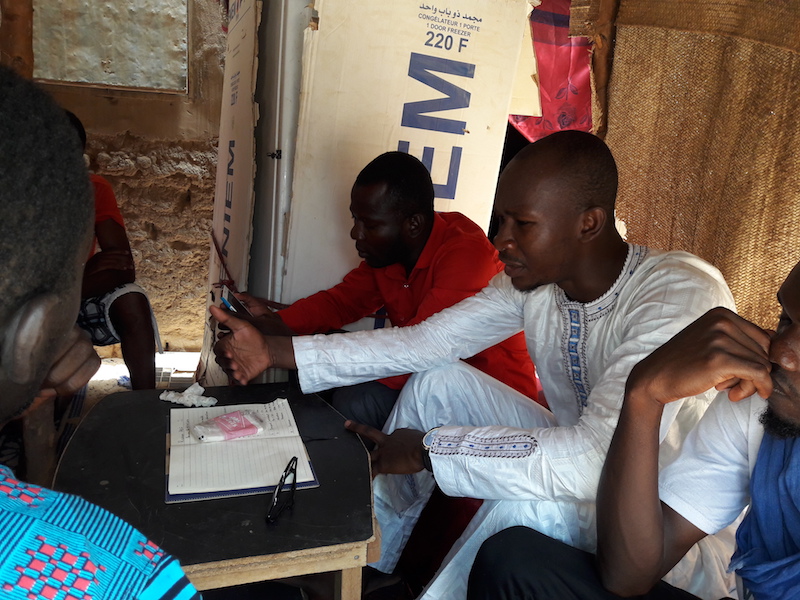
Bourem is a town in northern Mali. It now has many government agencies and services, and five years ago, it opened its first high school. It has a diverse population, including many of Mali’s ethnic groups like, the Songhoy, Tamacheq, Touareg, and Arabs. I am proud to say that my community works hard to address and prevent ethnic tensions between these diverse groups. Farming and fishing are typical jobs in Bourem, which also has the huge youth population that is characteristic of a lot of the developing world.
However, Bourem is a place without many resources, including access to technology. In 2013, I attended the YES 10th Anniversary Workshop in Istanbul, Turkey, and came up with the idea to open an ICT center in Mali. I called the project YESICT4ALL, and actually won funding for it through the workshop. Before the ICT center was created in Bourem in 2014, people had to go to a great deal of trouble to complete simple tasks like basic computing and printing. At times, a person had to travel 95 km to another town just to print a document. To this day, the high school offers computer classes, but since they do not have a single computer, students learn about computers only in theory.
The Center is a public facility that has served the entire town of Bourem, but the cost and availability of electricity has made it challenging to run the building. The local power plant often has lengthy power outages, so the Center had to rely on a costly generator most of the time. We were always very careful about using electricity, and only turned on the computers and printer when needed.
Since Mali is a Sun Belt country, we realized that installing solar panels and batteries could really help us. We wanted this to be a community effort, so we worked with the mayor’s office, the Bourem Teachers Association, and local youth associations to find ways to make the Center more accessible and affordable. We found a solar energy expert, who designed a comprehensive installation diagram for the Center, which involved two solar panels and four batteries that would power all of the computers. The materials were transported to Bourem from Bamako on September 7, 2016. When the materials arrived in Bourem, we held a meeting with local youth associations to talk about the future of the Center and how it can best serve the needs of the community. Teachers, students, and the general public also had an opportunity to listen to the meeting on the local radio, a prevalent means of communication in rural Africa. We also met with the mayor. We realized that we needed to move the Center to another location downtown so that it would be accessible to more people and better suited for our solar installation.
The new location we rented required some maintenance, so before moving in, we worked with local youth volunteers to repair doors and windows, fix floors, and pain the walls and roof. When we were ready, a local technician installed the solar panels on the roof and the batteries inside. He calculated the power outputs and then we tested the computers. Now everything is running smoothly and we are impressed that solar energy is reliable and saves money. In the past, we used to have to purchase a gallon of petrol for about $6 every two days. Sometimes the users of the Center brought their own petrol. With the two solar panels, at 250 amps each, and four batteries, at 200 amps each, we have a combined constant power output of 800 amps. The total consumption of the five computers is 750 amps so we have even been able to reduce the user fees for trainees. We have monthly routine maintenance checkups to maintain efficiency. The ICT center is the first public facility in Bourem running on solar energy.
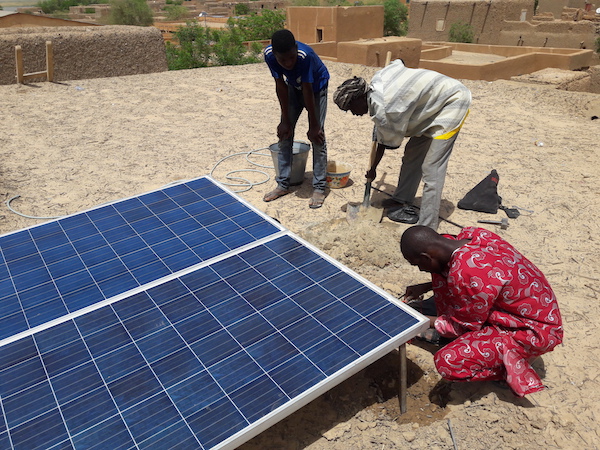
The Center serves two main target groups, both of which are growing. The first group is comprised of students and employees of administration agencies. They need our services because they use computers on a daily basis. The students get a chance to practice what they learn at school and gain a better understanding of computer science. The second group is comprised of adults who want to become more marketable by learning about computers. The ICT center provides training on Windows and Microsoft Office, including Word, Excel and PowerPoint. Over 300 students and about 100 professionals from local municipalities have attended our trainings. We also provide printing, photocopying and scanning services.
With the solar energy, our training classes have increased to three hours per session instead of two and we are able to maintain a stable schedule with no power interruptions. We are open eight hours per day and people have already expressed their satisfaction because we are available when they need us. Even the municipal services, including the mayor and the prefect’s offices, come to us when there is a power outage. The impact of the Center can be seen throughout the town, and we are often the topic of discussion about development.
Mr. Ibrahim Issouf, a leader of Association des Jeunes de Djambourou, a youth association, said, “Mahaitou, you can’t imagine how you have made our work easier. Even with money in hand, we couldn’t get these services here in Bourem before the Center. I have been to the Center three times myself and I am very satisfied.” The deputy mayor of Bourem, Mr. Amaimoune Maiga, paid us a visit and said, “Your project is an example for all of us if we want Bourem to be what we want it to be. Your first project responded to our need for an ICT center and this second project has made it a symbol for our town. Bourem salutes you.”
My long term hope is to grow this project to include the ICT center, a library, and a youth center that will continue to help the people of Bourem for years to come. I plan to work with local authorities in order to find resources to make this dream come true. I hope to build a center that runs through solar power so that it will be independent in terms of finances and energy.
This project gives me personal satisfaction when I see the impact it is having in peoples’ lives every day. This experience taught me not only how to develop and implement the project, but also how to work with local authorities and deal with unexpected events. I want to finish by thanking everyone who helped to make this project a reality. Special recognition goes out to the sponsor of the YES program, the U.S Department of State, Bureau of Educational and Cultural Affairs. I thank American Councils for International Education for their advice and support. I am grateful to the iEARN Mali office for their support as well as the mayor of Bourem and all the youth whose efforts contributed to this beautiful achievement.


